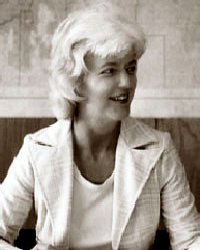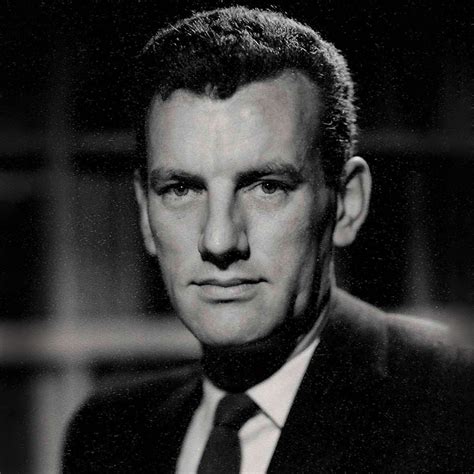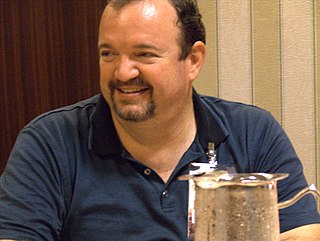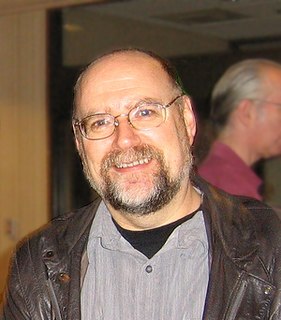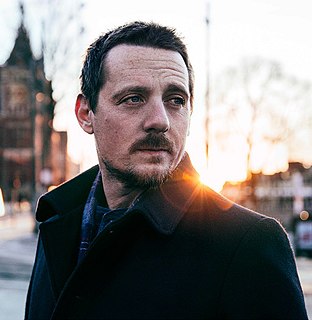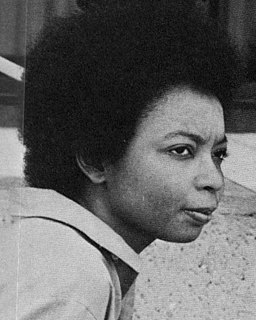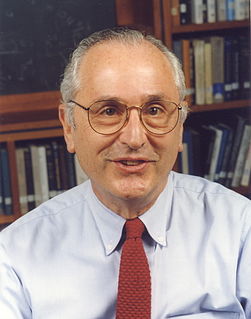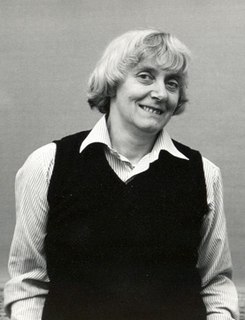Top 105 Cosmology Quotes & Sayings - Page 2
Explore popular Cosmology quotes.
Last updated on November 19, 2024.
A lot of people feel like urban fantasy is a shortcut that gets you around world-building, because it's set "in the real world." But it doesn't really work that way, as I found out. You have to come up with just as consistent an internal cosmology and magic system as you would if you were writing high fantasy.
The Europeans and the Americans are not throwing $10 billion down this gigantic tube for nothing. We're exploring the very forefront of physics and cosmology with the Large Hadron Collider because we want to have a window on creation, we want to recreate a tiny piece of Genesis to unlock some of the greatest secrets of the universe.
Order can arise from chaos without anyone or anything directing the process when unstable combinations of atoms perish and others persist. In the 17th century, Descartes applied this insight to cosmology, and long before Darwin presented his more rigorous ideas about variation and selection, people began to speculate more openly about the origins of life and the species in Epicurean terms.
The future. Space travel, or cosmology. Alternate universes. Time travel. Robots. Marvelous inventions. Immortality. Catastrophes. Aliens. Superman. Other dimensions. Inner space, or the psyche. These are the ideas that are essential to science fiction. The phenomena change, the basic ideas do not. These ideas are the same philosophical concepts that have intrigued mankind throughout history.
A scenario is suggested by which the universe and its laws could have arisen naturally from nothing. Current cosmology suggests that no laws of physics were violated in bringing the universe into existence. The laws of physics themselves are shown to correspond to what one would expect if the universe appeared from nothing. There is something rather than nothing because something is more stable.
Sacred scripture wishes simply to declare that the world was created by God, and in order to teach this truth it expressed itself in terms of the cosmology in use at the time of the writer. Any other teaching about the origin and makeup of the universe is so alien to the intentions of the Bible, which does not wish to teach how heaven was made but how one goes to heaven.
What we're starting to see is a quantum biology, it being applied in biology and cosmology and a host of other sciences, because it does really pertain to how we know. It really helps bring epistemology, which is how do we know what we know, out of the realm of philosophy and brings it into the realm of science.
Remember that the past fifty years has been the age of the Big Bang cosmology. We have learnt to see all reality as a slow-motion explosion, as pouring itself out and passing away, as dissemination. We live in a postmodern epoch in which there is nothing absolute, nothing permanent and nothing substantial.
The Navajo, for example, regard their traditional lands as within the four sacred peaks. One of those sacred peaks is the San Francisco Peaks where the ski resort, one of the holiest, sacred mountains in Navajo cosmology. I mean, it's considered a horrible desecration. I mean, you know, put it into another cultural context and you wouldn't be able to think of that being, with any other racial group. But for Indians because, you know, we think they really don't care about land or they have primitive ideas or they don't have ownership, we completely disrespect that.
A lot of humanists treat religion as if it were simply a kind of rival cosmological hypothesis, and that this is all it is. My view is that to the extent that religions are cosmological hypotheses, this is not the only important thing about them, and we - atheists- will never get a proper understanding of what religion is if we focus too much on the cosmology.
I've always been fascinated by the Norsemen, their lives, history and cosmology. The more we study them the more interesting they become... breaking their own stereotypes. We usually think of them as barbarians, but there were aspects to their society that shows a tremendous level of civilization, sophistication and social advance.
I'm trying to understand cosmology, why the Big Bang had the properties it did. And it's interesting to think that connects directly to our kitchens and how we can make eggs, how we can remember one direction of time, why causes precede effects, why we are born young and grow older. It's all because of entropy increasing.
I suppose my interest in looking for life elsewhere in the universe really dates back to my teens. What teenager doesn't look up at the sky at night and think am I alone in the universe? Well most people get over it, but I never did and though I made a career more in physics and cosmology than astrobiology I've always had a soft spot for the subject of life because it does seem so mysterious.
For ten years, I wrote regular columns about science for women's magazines, and to my knowledge I'm the only person in the world who can say that. This has no kudos in either the science-writing world or the academic world, but it's one of the most challenging things I've ever done. It's much harder to write about cosmology for a magazine like Vogue than for the New York Times, which I've also written for, because you have to imagine that on the page opposite there'll be an advertisement for eyeliner, or an article about the latest trends in skirt length.
I have my own cosmology that's kind of like an esoteric mix of a lot of different things that work for me and that to me, are worth exploring. There is a little bit of the archetypal Christianity that I've kind of reconciled because when you're raised that way, inevitably that infrastructure will persist into your adulthood.
Natural history is not taught in seminary. This is curious, as most people in pastoral ministry are about 567 times more likely to be asked about cosmology or sub-nuclear physics or human biology or evolution than they are to be asked about irregular Greek verbs or the danger of the patripassionist heresy. If we monotheists are going to go around claiming that our "God made the heaven and the earth," it is not unreasonable to expect us to know something about what that heaven and earth actually are.
A lot of people they don’t know that Africans even named the stars, that different peoples, different so-called native peoples, have their own names for the stars, and have star charts just as accurate as the Chinese star charts, which are more ancient than the European star charts or even the Arabic ones or the star charts of the New World civilizations. Everybody’s got their own cosmology. Everybody’s got their own description of the universe.
There may be an art to conversation, and some are better at it than others, but conversation's virtue lies in randomness and possibility: people, without a plan, could speak a spontaneous, unexpected truth, because revelation rules. Telling words recur in this smart, generous conversation between Stephen Andrews and Gregg Bordowitz: patience, responsibility, feminism, ethics, cosmology, AIDS, gift, freedom, mortality.
All at once, funding was gone due to the Mansfield Amendment, which was a reaction to the Vietnam War. In the minds of the local RLE administrators, research in gravitation and cosmology was not in the military's interest, and support was given to solid-state physics, which was deemed more relevant.
There is nothing as dreamy and poetic, nothing as radical, subversive, and psychedelic, as mathematics. It is every bit as mind blowing as cosmology or physics (mathematicians conceived of black holes long before astronomers actually found any), and allows more freedom of expression than poetry, art, or music (which depends heavily on properties of the physical universe). Mathematics is the purest of the arts, as well as the most misunderstood.
I do not personally want to believe that we already know the equations that determine the evolution and fate of the universe; it would make life too dull for me as a scientist. ... I hope, and believe, that the Space Telescope might make the Big Bang cosmology appear incorrect to future generations, perhaps somewhat analogous to the way that Galileo's telescope showed that the earth-centered, Ptolemaic system was inadequate.
We develop all our sciences, archeology, cosmology, psychology, we tabulate and classify and cling to our sacred definitions, our divisions, without any attempt to synthesis, without the humility to see that these are only parts of a total knowledge. ... But somehow we ought to be able to keep the idea of the totality of experience and knowledge at the back of our minds even though the front's busy from morning til night with the life cycle of the liver fluke.
Very little in science fiction can transcend the gimmickry of a technical conceit, yet without that conceit at its heart a book is not truly science fiction. Furthermore, so little emerging thought and technology is employed by sf writers today that the genre is lagging far behind reality both in the cosmology area and the technology area: sf is no longer a place to experiment, but is now very derivative.
Both education and religion need to ground themselves within the story of the universe as we now understand this story through empirical knowledge. Within this functional cosmology, we can overcome our alienation and begin the renewal of life on a sustainable basis. This story is a numinous revelatory story that could evoke the vision and the energy required to bring not only ourselves but the entire planet into a new order of magnificence.
Like mathematics and music and cosmology and philosophy, poetry, too, can "infinitize" us, granting us what immortality there is to be had in this mortal life. And all those who vibrate in harmony to language that itself vibrates to the harmonies of the infinite are entitled to inclusion among the "small group of people.
In the cosmology behind psychology, there is no reason for anyone to be here or to do anything... I'am an accident - a result - and therefore a victim... if I'm only a result of past causes, then I'm a victim of those past causes.... or, if you look at it from the sociological perspective, I'm the result of upbringing, class, race, gender, social prejudices, and economics. So I'm a victim again. A result .
The Hindu religion is the only one of the world’s great faiths dedicated to the idea that the Cosmos itself undergoes an immense, indeed an infinite, number of deaths and rebirths. It is the only religion in which the time scales correspond, no doubt by accident, to those of modern scientific cosmology. Its cycles run from our ordinary day and night to a day and night of Brahma, 8.64 billion years long, longer than the age of the Earth or the Sun and about half the time since the Big Bang.
Religion is part of the human make-up. It's also part of our cultural and intellectual history. Religion was our first attempt at literature, the texts, our first attempt at cosmology, making sense of where we are in the universe, our first attempt at health care, believing in faith healing, our first attempt at philosophy.
Lest we forget, the birth of modern physics and cosmology was achieved by Galileo, Kepler and Newton breaking free not from the close confining prison of faith (all three were believing Christians, of one sort or another) but from the enormous burden of the millennial authority of Aristotelian science. The scientific revolution of the sixteenth and seventeenth centuries was not a revival of Hellenistic science but its final defeat.
According to Hindu cosmology, we're in the kali yuga, a dark period when the cow of history is balanced precariously on one leg, soon to topple. Then there are our new-age friends who believe that this December we're in for a global cage-rattling which, once the dust has settled, will usher in a great spiritual awakening. Most of this apocalyptic noise appears to be just wishful thinking on the part of people who find life too messy and uncertain for comfort, let alone for serenity and mirth.
The asymmetry of time, the arrow that points from past to future, plays an unmistakable role in our everyday lives: it accounts for why we cannot turn an omelet into an egg, why ice cubes never spontaneously unmelt in a glass of water, and why we remember the past but not the future. And the origin of the asymmetry we experience can be traced all the way back to the orderliness of the universe near the big bang. Every time you break an egg, you are doing observational cosmology.
There are a whole other range of sciences that must deal with the narrative reconstruction of the inordinately complex events of history that can occur but once in their detailed glory. And for those kinds of sciences, be it cosmology, or evolutionary biology, or geology, or palaeontology, the experimental methods, simplification, quantification, prediction and repetition of the experimental sciences don't always work. You have to go with the narrative, the descriptive methods of what? Of historians.
If you start parsing the cause-and-effect chain backward through time, eventually you land in cosmology - does the story begin with the Big Bang or the out-of-nothing creation of the world by the word of a Southern Baptist god? And that question is even more fraught than any of the others. The stakes couldn't be any higher, because not it's not just a question of life and death, but also a question of life after death or eternal torture after death.
Every one of the world's "great" religions utterly trivializes the immensity and beauty of the cosmos. Books like the Bible and the Koran get almost every significant fact about us and our world wrong. Every scientific domain -- from cosmology to psychology to economics -- has superseded and surpassed the wisdom of Scripture. Everything of value that people get from religion can be had more honestly, without presuming anything on insufficient evidence. The rest is self-deception, set to music.
For a long time it has been known that the first systems of representations with which men have pictured to themselves the world and themselves were of religious origin. There is no religion that is not a cosmology at the same time that it is a speculation upon divine things. If philosophy and the sciences were born of religion, it is because religion began by taking the place of the sciences and philosophy.



